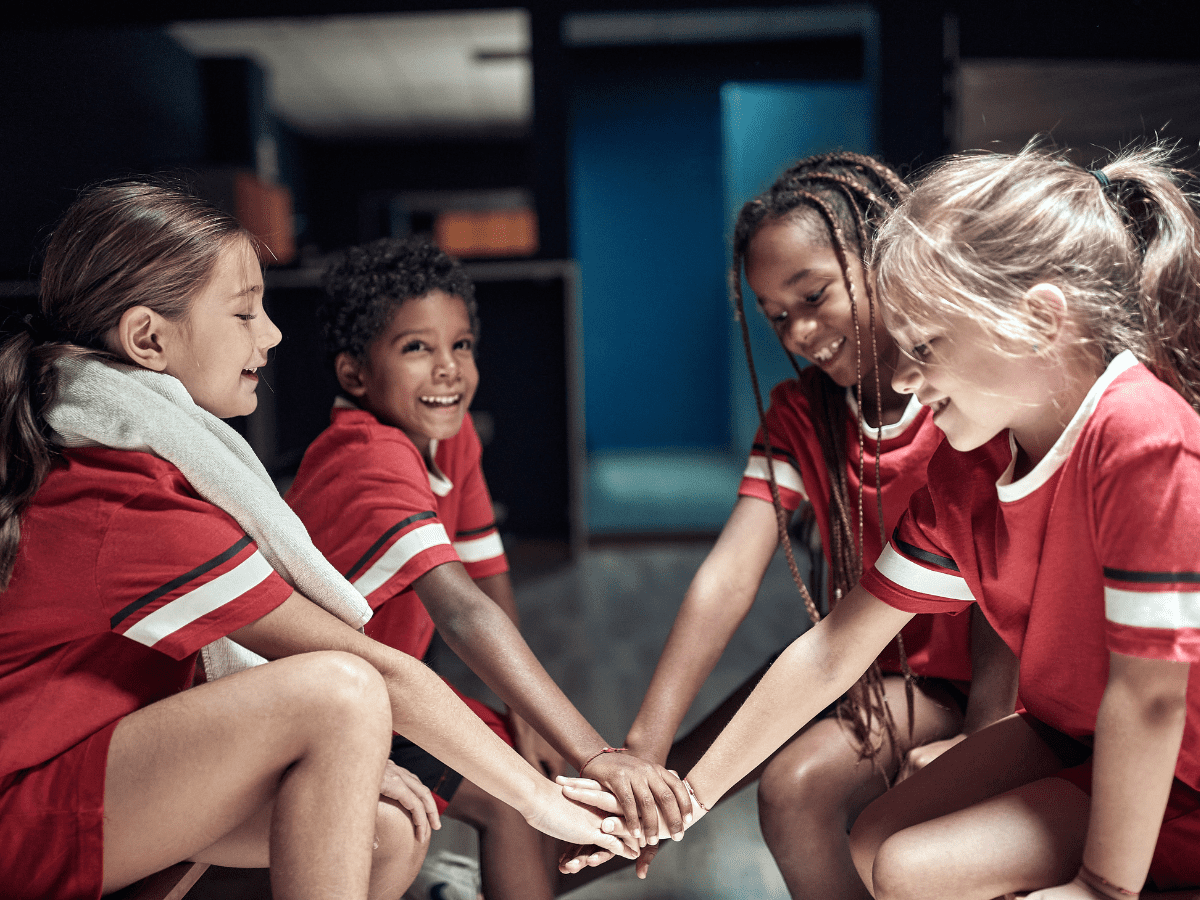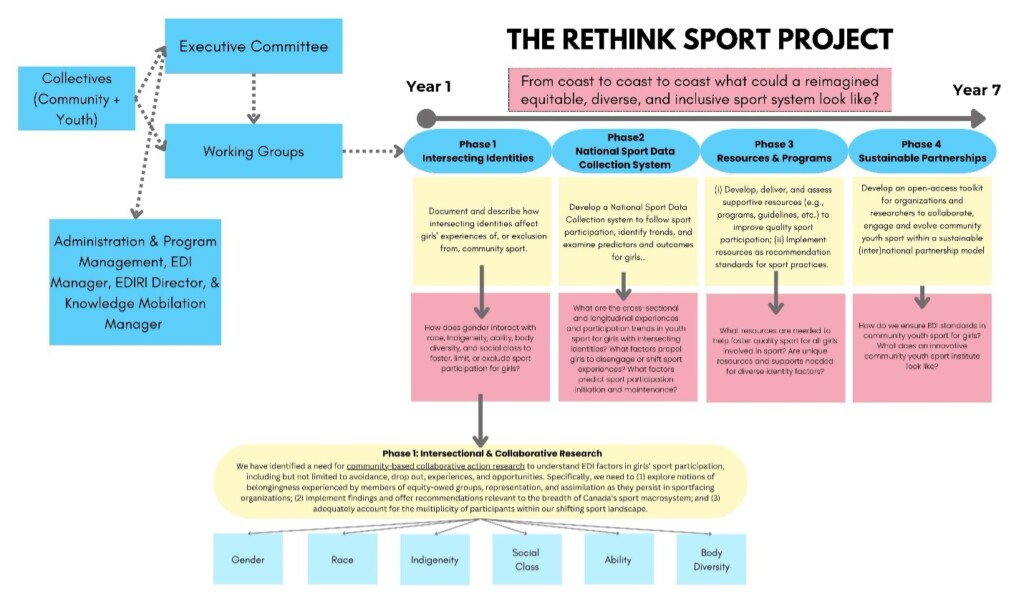
From coast to coast to coast, what could a reimagined equitable, diverse, and inclusive youth sport system look like, especially for girls?
This is the question driving the mission of the ReThink Sport Project. Given what we know; that youth face a myriad of barriers to sport participation including identity factors such as gender, race, Indigeneity, disability, body size and shape, disability and social class; the state of youth sport is currently inequitable and often offers poor quality experiences that limit physical, mental, social, developmental, and spiritual benefits.
This status of youth sport is unfortunate because community sport plays a pivotal role in youth development, with over 80% of Canadians acknowledging its contribution to character-building, well-being, resilience, and community strength. Yet, more than 50% of youth in Canada are missing out on these benefits because they do not participate in any sports. Girls are less likely to participate in and are up to 6-times more likely to drop out of sport during adolescence. The historical disadvantages faced by girls in accessing and participating in sports have led to persistent inequalities, particularly for those who are racialized, come from lower-income backgrounds, have disabilities, and/or are higher-weight. These intersecting identity factors significantly impact sport access, participation, and the quality of experiences.
Addressing these challenges requires a concerted approach. Fostering a deeper understanding of these factors and implementing transformative strategies, we can begin to level the playing field and create more inclusive opportunities for all youth. Recognizing the challenges and potential solutions, a team of more than 65 academic, research, and community partners, policy leaders, sport organization leaders, and sport advisors aims to help re-envision the sports system through a new nationally funded project. Led by Dr. Catherine Sabiston at the University of Toronto, the team will build equitable, diverse, and inclusive participation, access and quality experiences in youth sport with a special focus on improving community sport participation, so everyone has a place to play. With a 7-year national partnership grant and a long-term vision for legacy, we are committed to driving positive change that will resonate for years to come.
The goals and objectives of the ReThink Sport Project

Many projects are underway across Canada to explore experiences, connect narratives, and document opportunities from youth involved and not involved in sport. This foundational research will lead to a priority-setting project that will identify integral research questions in community youth sport as identified by athletes, non-participants, parents and guardians, coaches, officials, administrators, policy leaders, community organizations, and researchers.
There are 4 main phases during the 7-year project:
- First, the team will document and describe how intersecting identities affect youths’ experiences of community sport.
- Second, the team will develop a national sport data infrastructure to collect meaningful and timely data on community sport experiences.
- Third, the team is documenting, evaluating, and developing supportive resources for community sport leaders and youth to help foster participation, access, and quality sport experiences.
- Finally, the team will integrate and mobilize knowledge to develop an open-access toolkit for organizations to collaborate, engage, and contribute to the timely issues in Canadian sport.
Ultimately, this project will provide a new set of tools for tackling the intersectional barriers faced by youth sport, particularly girls’ sports in Canada. This project will help us to understand not just what stops youth from playing but why some kids may not have access to sport and exercise, and how and why some kids thrive while others do not experience benefits. This work will not only revamp existing programs but also help to establish a comprehensive data collection process to track physical activity participation, identify trends, and examine important personal, social and environmental predictors and outcomes for youth. Ideally, tailored resources and programs can be integrated into standards of sport practices, informed by the United Nations Sustainability Development Goals and the Truth and Reconciliation Commission of Canada’s Calls to Action. A systems thinking approach is vital to effectively tackle the challenges and goals of this initiative.
Youth and community partner informed goals and outcomes
The ReThink Sport research project uses a community-based approach that includes input from various community members and experts. This approach helps us understand issues of fairness, diversity, inclusion, and accessibility in girls’ sports.
Using this community-based approach will help us to: (1) explore feelings of belonging among underrepresented groups in sports, (2) apply our findings to improve sports across Canada, and (3) consider the diverse backgrounds of participants in our evolving sports environment.
The intentional yet natural integration of community partners and researchers throughout the duration of the project is possible with the guidance of an advisory collective to drive and guide the work (see Figure 1 below).
To minimize power imbalances, there are 2 separate groups:
- a sport leaders collective comprised of parents, officials, administrators, and other sport leaders; and
- a youth collective comprised of adolescents involved and not involved in sport.
A diversity skills and competency matrix, rooted in equity, diversity, inclusion, and accessibility principles and the ReThink Sport Project identity factors (for example, race, Indigeneity, social class, ability, gender, and weight and body diversity), has been developed to guide recruitment into the advisory groups. The entire process of youth engagement has also been formalized into guidelines that can be shared with sport organizations desiring to form youth advisories or collectives to inform their decision-making.
In fact, there has been growing recognition of the importance of engaging youth in various aspects of research and knowledge mobilization, particularly within the realms of children’s health and rights. With the growing recognition of the importance of youth advisories, the Rethink Sport Project offers a framework and supporting materials to help engage youth for sport-related decisions-making, advocacy, and policy and program progress in Canada.

Expected outputs, outcomes, and indices for progress
This extensive multidisciplinary collaborative partnership aims to innovate the landscape of Canadian community youth sport by focusing on equity, diversity, inclusion, and accessibility. The project has 2 main goals:
- Enhancing knowledge and practices: Improve understanding, resources, practices, and policies related to equity, diversity, inclusion, and accessibility in youth sports.
- Transforming leadership: Change how sports are led by introducing new ways of thinking, creating new resources (like toolkits), hiring highly qualified individuals, and developing future leaders in sports research and industry.
This work will guide policy development, education and learning on best practices in equity, diversity, inclusion, and accessibility. It will also promote collaboration among Canadian leaders in youth sport and create strategies to address sustainable development goals and respond to calls for truth and reconciliation. The project’s impact will unfold over many years. Outputs and outcomes will be developed and assessed regularly to ensure they meet the project’s goals.
A few examples of the key deliverables of this project include:
- Diversity and competency skills matrix to help organizations and researchers appropriately identify, recruit, and work with representative advisory group members;
- Youth engagement implementation guidelines to establish youth advisory groups;
- Action-oriented reports tied to unique and novel research findings with user-informed interpretations;
- A national database to explore and understand trends and trajectories of sport participation, drop out, experiences and non-participation;
- Standardized evaluation processes and measures to guide consistent learnings, program development and implementation, and shared outcomes for increasing and improving community youth sport;
- Open-access toolkit (such as data collection, evaluation platforms, and resources, programs, and strategies);
- An increase in trained sport leaders and researchers.
As we await this continued work there are some great resources we recommend, ones that informed this work, including:
- Canadian Tire’s Jumpstart State of Play Youth Report 2024
- Canadian Women and Sport’s Rally Report Rally Report 2022: A Call for Better, Safer Sport
- MLSE Foundation’s Change the Game in 2024: Growing the Game Means Changing the Report
- True Sport’s The Power of Sport: The True Sport Report 2022 Practical Implications and Contributions for Youth Sport Programs and Policies
The Rethink Sport Project aims to create a transformative impact on the Canadian community youth sport ecosystem by enhancing equitable access and participation in community sports for youth, and in particular girls, by providing evidence-based resources and programs to improve sport experiences. By the end of the initiative, we will know what an equitable, diverse, and inclusive sport system can look like that can help transform the Canadian community youth sport ecosystem for all.